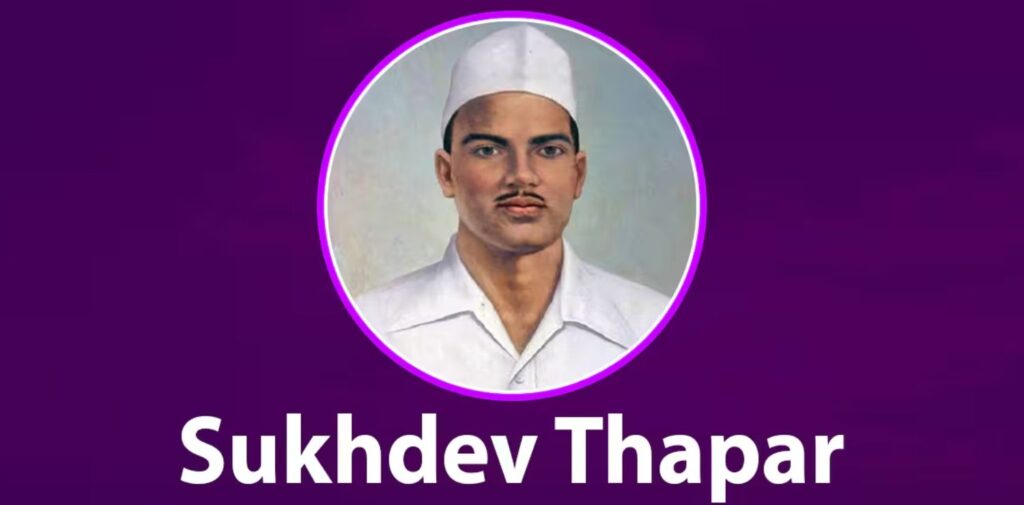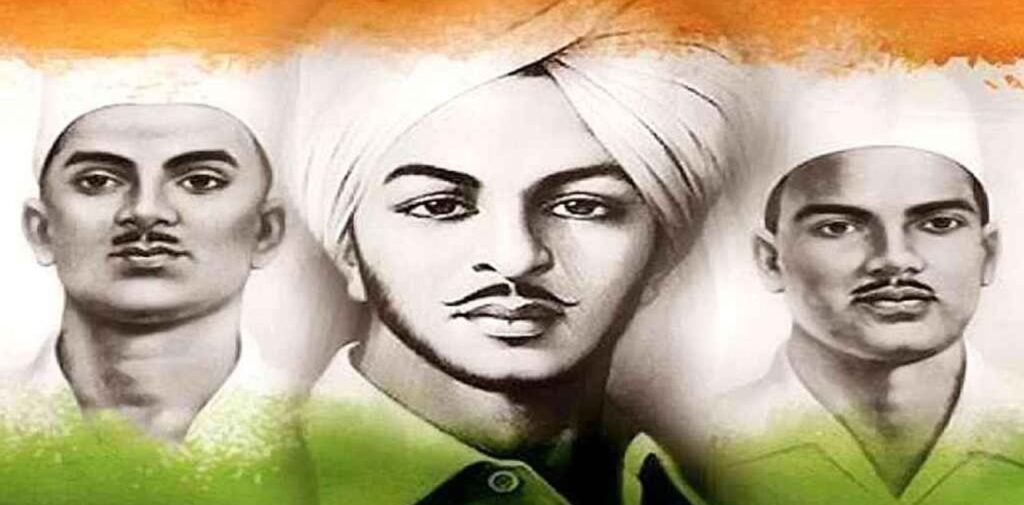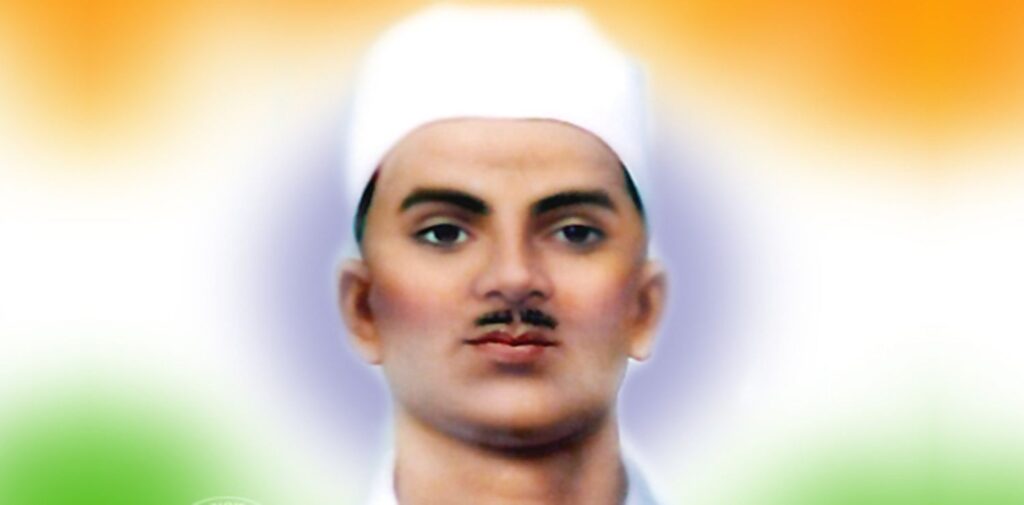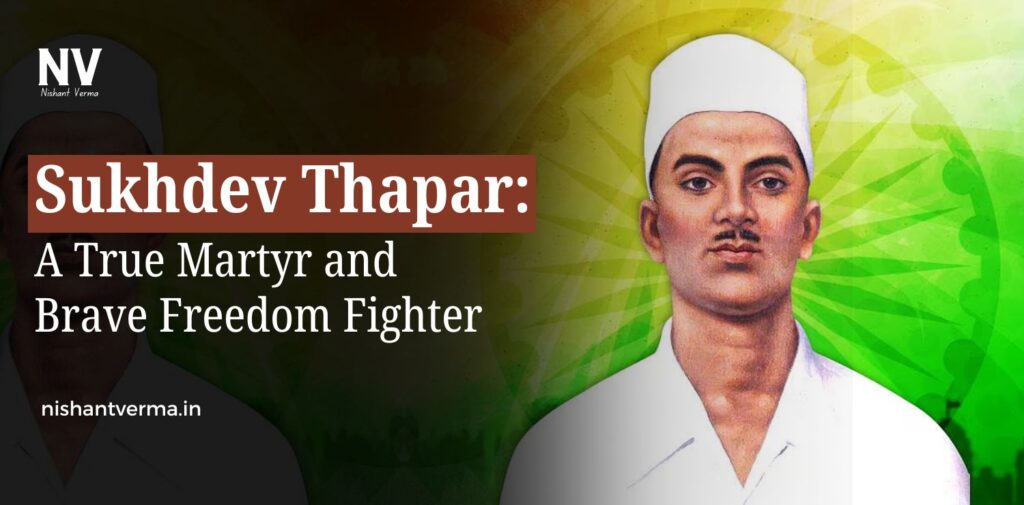In the annals of India’s freedom struggle, there are countless names that stand out for their remarkable courage, sacrifice, and patriotism. Among these names, Sukhdev Thapar holds a prominent place. A young revolutionary whose bravery and selflessness have become symbols of the fight for India’s independence, Sukhdev’s life, though short, was filled with immense determination to rid India of British colonial rule.
Sukhdev Thapar was one of the key revolutionaries who contributed to the Indian freedom struggle alongside Bhagat Singh and Shivaram Rajguru. His name is inextricably linked with the sacrifices made by these martyrs on March 23, 1931, the day when the British executed him along with his comrades. Today, more than 90 years after his martyrdom, Sukhdev continues to be remembered as one of the greatest freedom fighters of India.
In this article, we will reflect on the life, bravery, and the extraordinary sacrifices made by Sukhdev Thapar in the service of India’s independence. His life is a source of inspiration for generations of Indians, and his unwavering commitment to the cause of freedom sets a powerful example of patriotism and selflessness.
Early Life and Background
Sukhdev Thapar was born on May 15, 1907, in Lahore, which is now in Pakistan. He came from a well-off, politically aware Sikh family that was deeply involved in the socio-political issues of the time. From an early age, Sukhdev showed a keen interest in the freedom movement and was inspired by the sacrifices of earlier revolutionaries like Lala Lajpat Rai and Ram Prasad Bismil.
Sukhdev’s early years were marked by a growing dissatisfaction with British rule, which he saw as oppressive and exploitative. His family’s political involvement, particularly his father’s active participation in the Ghadar Party, influenced his perspective on the injustices of British colonial rule. The Ghadar Party, formed in the early 20th century, was a revolutionary group aimed at overthrowing British rule in India. This party played a crucial role in shaping the minds of young revolutionaries like Sukhdev.
From a young age, Sukhdev was passionate about his country’s independence and was driven by a strong sense of nationalism. He became involved in political activism during his school and college days and soon joined the Hindustan Socialist Republican Association (HSRA). The HSRA was a revolutionary group that believed in an armed struggle to oust the British from India. It was in this organization that Sukhdev met like-minded individuals, including Bhagat Singh and Shivaram Rajguru, who would become his close friends and allies in the fight for India’s freedom.

Revolutionary Zeal and Participation in the Struggle
Sukhdev Thapar’s journey into the revolution was marked by a sense of purpose and a commitment to the cause of India’s freedom. By joining the HSRA, Sukhdev became part of a group of young men and women who were determined to use force and revolutionary methods to challenge British rule. This decision was not made lightly, as it came at a time when non-violent methods of protest were gaining momentum under the leadership of Mahatma Gandhi. However, Sukhdev and his comrades, like Bhagat Singh, believed that only an armed rebellion could free India from the clutches of colonialism.
One of the most significant acts that Sukhdev participated in was the killing of J.P. Saunders. This was part of the revenge for the death of Lala Lajpat Rai, who had been injured in a police baton charge during a protest against the Simon Commission. The police officer responsible for Rai’s death, James A. Scott, was not brought to justice. In retaliation, Bhagat Singh, Sukhdev, and Rajguru decided to assassinate J.P. Saunders, a police officer who was involved in the brutal treatment of the Indian people. Although the plan was to kill Scott, Saunders was mistakenly killed in the process. This act became a defining moment in the revolutionary struggle against British rule.
Despite the mistake, the murder of Saunders was a bold message to the British that India’s youth would not remain silent in the face of injustice. After this act, Sukhdev, Bhagat Singh, and Rajguru went underground for a time but were eventually caught and arrested by the British authorities.
Sukhdev’s Imprisonment and Trial
Following their arrest, Sukhdev Thapar, Bhagat Singh, and Rajguru were subjected to a harsh trial. The three young revolutionaries used the trial as an opportunity to continue their fight for India’s freedom. Instead of showing fear or regret, they turned the courtroom into a platform to denounce British imperialism and their methods of governance.
Sukhdev, along with Bhagat Singh and Rajguru, faced severe torture and harsh treatment during their imprisonment. They were determined to make their trial an opportunity to further their cause, and in doing so, they became symbols of bravery and resistance. Sukhdev’s courage was evident throughout the trial, and he remained unshaken, never once compromising on his beliefs.
The British government, aware of the immense popularity of Bhagat Singh and his comrades, was determined to make an example of them. Despite widespread protests and appeals for clemency, the British authorities sentenced all three to death. Their conviction was met with outrage across the country, and many Indian leaders, including Subhas Chandra Bose, demanded their release. But the British were unmoved, and on March 23, 1931, Sukhdev Thapar, Bhagat Singh, and Rajguru were hanged.

The Martyrdom of Sukhdev Thapar
The execution of Sukhdev Thapar, Bhagat Singh, and Rajguru became a watershed moment in India’s freedom struggle. While the death of these three young men was a tragedy, it also served to galvanize the masses in their fight against British rule. Their martyrdom filled the hearts of millions with anger and determination, and it significantly strengthened the resolve of the Indian independence movement.
In his final moments, Sukhdev remained steadfast and unwavering. His courage and patriotism were evident as he faced the gallows with a calm and composed demeanor. He, along with his comrades, went to the scaffold chanting revolutionary slogans. His last words were a tribute to the country he loved so deeply, as he said, “This is not the end; it is only the beginning.” The death of Sukhdev was not the end of his legacy—it was the beginning of a greater push for India’s independence.
Sukhdev’s Legacy
Though Sukhdev Thapar’s life was tragically cut short, his bravery, selflessness, and dedication to India’s freedom have left a lasting legacy. The sacrifice of Sukhdev, Bhagat Singh, and Rajguru inspired a whole generation of freedom fighters and provided the final push that led to India’s independence in 1947.
Sukhdev’s legacy is not just one of martyrdom, but also of the power of the youth in a nation’s struggle for freedom. Despite being in his early twenties, he demonstrated immense maturity, clarity of thought, and a deep commitment to his country’s independence. His contribution to the freedom movement serves as a reminder of the invaluable role that the youth played in the fight against colonialism.
His courage continues to inspire young Indians today, and his name is remembered in every corner of the country. Sukhdev, along with Bhagat Singh and Rajguru, remains a symbol of the spirit of rebellion against injustice and the unwavering determination to achieve freedom.

Conclusion: A Martyr Who Will Never Be Forgotten
Sukhdev Thapar’s bravery and dedication to the cause of India’s independence are qualities that every Indian can look up to with pride. His life, though short, serves as an example of what it means to fight for what is right, even at great personal cost. His martyrdom is a testimony to the unbreakable spirit of those who laid down their lives for the freedom of India.
On the 23rd of March every year, Shahid Diwas is observed to remember the sacrifices of Sukhdev, Bhagat Singh, and Rajguru. Their courage continues to inspire millions of people in India and around the world to stand up against injustice and oppression. As we honor their memory, let us also pledge to continue their fight for a just and free world, where the values of equality, liberty, and fraternity are upheld.
Sukhdev Thapar, a young revolutionary whose name will forever be etched in the history of India’s freedom struggle, lives on in the hearts of every patriot who seeks justice and equality for all. His bravery will never be forgotten. Inquilab Zindabad!




